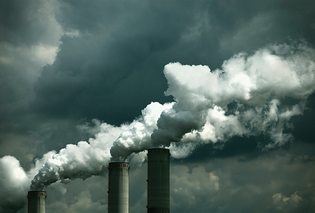
Drbouz/Istock
Emissions from a coal-burning power plant. Yale will no longer invest in coal mining operations.
View full image
It was late June, a few days after the temperature on the ground in the Arctic equaled what the temperature in the air in Portland would be a few days later—a blistering 116 degrees Fahrenheit—when President Peter Salovey ’86PhD and Provost Scott Strobel sent an email to the Yale community announcing the university’s plans to respond to the climate crisis and “avoid catastrophic, irreversible damage to our planet.” Besides setting new carbon-reduction goals—carbon neutrality in day-to-day operations by 2035, zero carbon production on campus by 2050—Yale detailed its first steps under a new investment policy announced in April that will eliminate some kinds of fossil fuel stocks from its endowment. It’s not the full divestment many student activists had campaigned for, but it sets a standard of emissions reductions and disclosure for companies in Yale’s portfolio.
Over $14 trillion in fossil fuel stock has been divested from institutional portfolios since 2014, and Yale’s isn’t the first big endowment to signal its intentions to add to the loss. In the last two years, Brown, Columbia, Georgetown, and the University of Cambridge, among others, have announced plans to divest from fossil fuels and reinvest in renewables over the next decade. At the same time, activist investors have been waging a war of words at places like Exxon and Chevron to get the industry to reform.
As of its last disclosure, Yale’s endowment had holdings in fossil fuel companies amounting to roughly $800 million. Along with the June announcement, Yale’s Advisory Committee on Investor Responsibility (ACIR) published a preliminary list of 45 fossil fuel companies barred from future investment by the endowment; the list will be expanded in the coming months. Coal mining operations will no longer be eligible for investment, a decision that caps off Yale’s $10 million divestment from coal mining and oil sands in 2016.
To get to this point, the university called on four terraces of committees and boards that, over the years, have weighed issues ranging from Puerto Rican debt to assault weapons: the Advisory Committee on Investor Responsibility (ACIR), the Corporation Committee on Investor Responsibility (CCIR), the full Yale Board of Trustees, and the new Committee on Fossil Fuel Investment Principles (CFFIP), which held two listening sessions with students last semester.
Scott Gigante ’21PhD is managing director of Yale Forward, an organization that sponsored climate activists as petition candidates for the Board until Yale ended the petition process. He says he’s “pleased to see that Yale has released a list of companies from which it will divest due to a lack of disclosure of Scope I and II emissions”—greenhouse gases produced as a direct consequence of or indirect aid to business. “However, without disclosing a list of companies in which the endowment remains invested, and whether or not the endowment ever held shares in the listed companies,” he says, “it is hard to say whether this decision has materially reduced Yale’s contributions to climate change.”
Jonathan Macey ’82JD, a Law School professor and the chair of both the CFFIP and the ACIR, is optimistic about the catalytic effect of the blacklist on the industry. “We’re motivating them [fossil fuel companies] in a respectful but decisive way to think about changing their business models and moving toward making a positive contribution to what needs to be a very broad-based fight against climate change,” he says.
 loading
loading